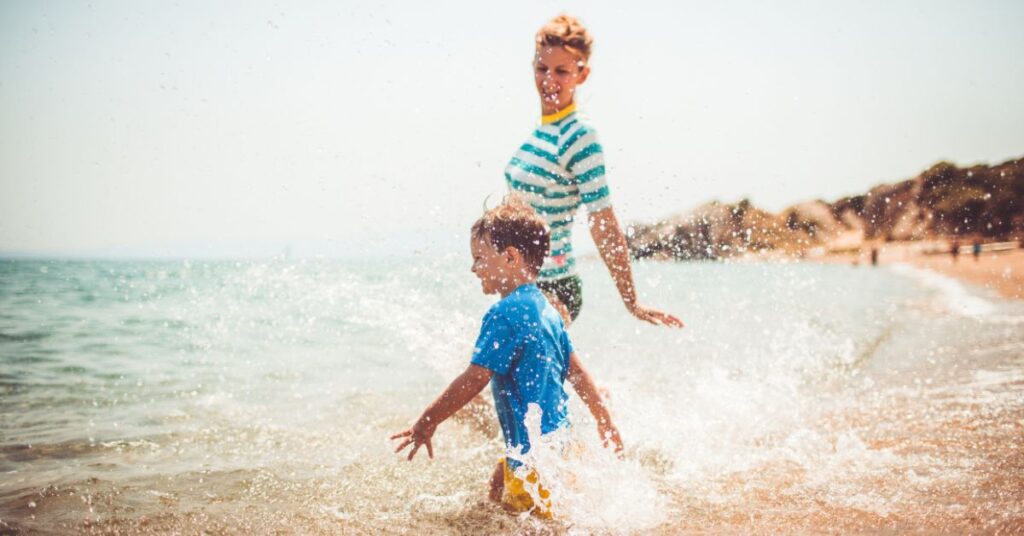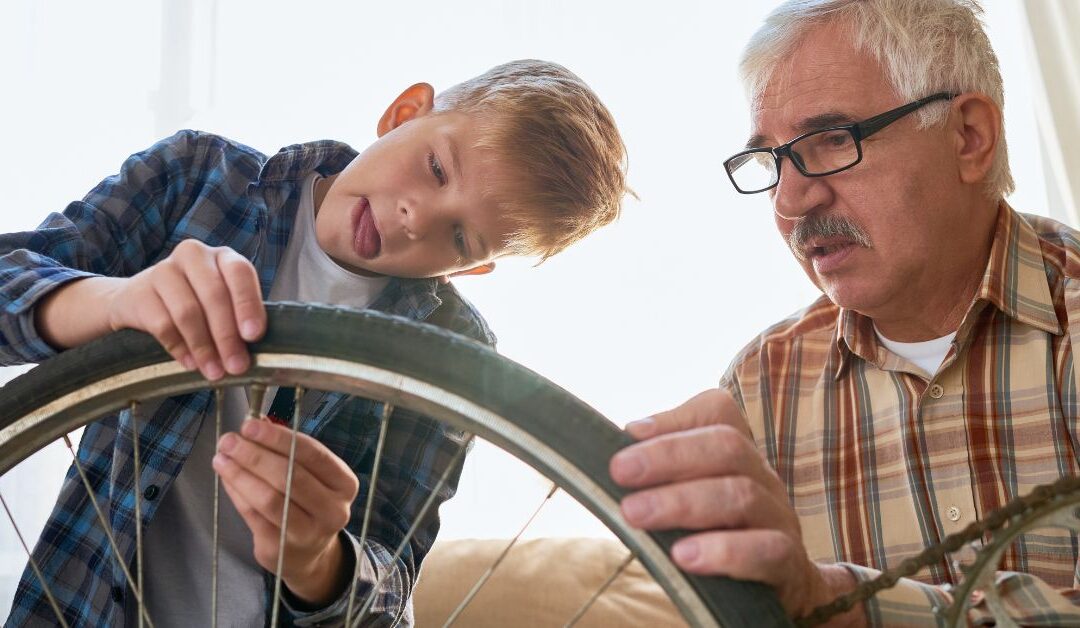Summertime is a fun time for many kids, being able to have more unstructured time and not having to focus on schoolwork. Yet, for our autistic and ADHD children, this time of year can be a time of some regression, or you can provide some structure and learning opportunities for your child to advance. So how can you help your autistic child progress in their skills during the summer?
Our experiences
Our son J thrives on routine, like a lot of autistic people. If we didn’t have a plan for the summer, then it was really hard for him. Beginning at age 7, we enrolled him in summer camp at my workplace. It was at the company’s large recreational park and run by a local YMCA. He attended each summer until he was 12 years old, and he thrived during that time. Every summer, we found he grew in his social skills and in other ways. He learned steps for being more independent since he needed to keep track of his stuff. (I did still spend a fair amount of time going through lost and found to locate missing sunscreen, swim trunks and water bottles for him and his brother!) He did have some behavior challenges, but the counselors there were wonderful working with him. J learned from those experiences and made friends at the camp.
When he turned 13, he switched to a camp for autistic teenagers and again made progress over the summer. In fact, he almost became a “junior counselor” of sorts because he spent as much time helping the other campers as he did doing the activities himself 😊 This coming week, he will enjoy an improv camp for autistic teenagers in our area, and I think he is going to love it.
Considerations for the summer

So how do you decide what to schedule for your child over the summer – or not schedule? Here are some things you can consider:
- How do you prefer to spend the summer as a family? If you like things unstructured, how can you put some routines in place for your autistic child to make it easier for them?
- Are you and your spouse both working or does one of you stay home with your children? That may determine the level and kind of childcare you will need throughout the summer.
- Are you taking a vacation during the summer? If so, make a plan to prepare your child for it, especially if you are taking an airplane to get there. Autism Travel also has some great information about travelling with autistic children.
- What activities does your autistic child enjoy during the summer? Make sure you include those into your schedule.
- What low-cost places and opportunities do you have locally? Does your library offer story time for kids? Do you have fun playgrounds near you? What about children’s museums or other venues your child may enjoy?
Ways to help your autistic child progress over the summer
There are many ways you can help your autistic progress – instead of regress – over the summer. Check out these tips:
1. Consider summer camp for your child
This was a big learning experience for our son J. He enjoyed the structure and all of the activities, including swimming and going on field trips. When J moved on to a local camp for autistic teenagers, the Medicaid waiver paid for it, which was a nice financial perk.
2. Look into extended school year (ESY)
For children with individualized education plans, many schools offer summer school for them. This can help them keep some routine related to school and improve their academics, without having to spend a normal, long day at school.
3. Teach your child life skills
Summertime is a great time to teach your child or teen life skills. Have a younger child? Switch out a couple of chores to help them learn new things. Do you have a teenager? Maybe you want to focus on teaching them how to cook or enroll them in driver education.
4. Enroll in your local library’s summer reading program
Want to help improve your child’s reading skills or just want to encourage them to read more? Register your child in a local summer reading program. My kids did this for years and loved receiving all the prizes throughout the summer. We read a lot anyway, but it was fun to be able to log hours and see just how much we could read during these weeks.
5. Provide summertime activity workbooks for your child to practice academic and thinking skills
Another way to keep your child actively learning during the summer is to provide academic and skill activity books. I did this with our kids when they were young, and it did help. It was especially helpful when they were in elementary school. This is a great opportunity to help your autistic child progress and retain academic skills over the summer. Here are some books to try:
Summer Brain Quest: Between Grades K & 1 (affiliate link)
Summer Activity Book for Kids: Summer Puzzles Activity Book for kids Includes Word Search, Word Scramble, Crossword, Maze, Number Place, Sudoku, Coloring And Much More! [for kids ages 8-12] (affiliate link)
Summer Bridge Activities 6-7 Workbooks, Math, Reading Comprehension, Writing, Science, Social Studies, Summer Learning (6th and 7th grade) (affiliate link)
6. Volunteer
Volunteering is a great way to learn new skills. In fact, it is one of the best ways to prepare for a first job, so get your autistic teenager involved in a volunteer effort over summer break.
7. Incorporate sensory play into your child’s day
Sensory play has so many benefits for your child, so include it in your activities for your child. When our son J was younger, we had a sandbox, swing set, trampoline and water activity table that he would use throughout the summer. All of them really helped with the sensory issues he was having at the time.
8. Schedule swimming lessons for your child

Swimming is a life-saving skill. If your child cannot swim well enough to tread water and save their lives if they fall into a body of water, ensure they keep taking lessons until they can. We had to enroll our son J in lessons for several years until I felt confident that he could swim well enough to save his life if he ever fell into water. He loved the splash area or baby pools, but he struggled for quite a while being able to swim in water that was five feet or deeper.
9. Encourage your autistic teenager to work a part-time job
Working a part-time job during high school is one of the best indicators that your autistic teen will be able to hold a job after they graduate. Our son J works part-time on weekends at a local retailer as a backroom associate. He unloads the boxes of items delivered throughout the week and puts the merchandise out for the other associates to move onto the store floor. It’s an entry level job that isn’t exciting, but he is learning valuable job skills and all the processes of working a job. That means being on time, working hard, knowing how to ask for time off, keeping track of his weekly schedule, etc.
10. Start lessons to learn a new skill
Is your child interested in playing a musical instrument? Learning a particular sport? Joining a dance class? Summer can be a great time to start lessons. They don’t have the pressure of school, so they may be more open to learning during this time. Some organizations also offer fun classes or workshops that your child may be interested in participating that last only for a day or couple of weeks. For example, our youngest son wasn’t sure if he wanted to play basketball on a team, so he took a beginner basketball clinic at our local YMCA. Our son J started martial arts at the same YMCA over the summer and then continued for a couple of years. J also took piano lessons for a while, and he takes vocal lessons now. A friend of mine found a local dance company that offers classes for children with additional needs and disabilities. Her daughter loves it!
11. Go on fun family outings
Summer also offers a good opportunity to visit venues locally. When our kids were young, we had memberships to our local zoo and children’s museum. We went several times throughout the summer. In addition, we found fun children’s places in towns within an hour or so of our home to make a day out of it. For instance, we would go to the WonderLab in Bloomington, Indiana, and then head to the Indiana University campus. I showed the kids where I used to live during college, and we had lunch at my favorite pizza place. It was fun, and they learned to so much at the WonderLab, which is a small science museum for children.
Do you have more suggestions on how to help an autistic child progress over the summer? Leave a comment so that we can share and encourage one another!










